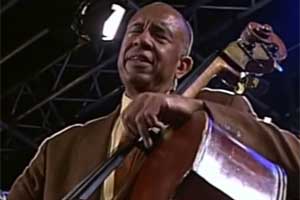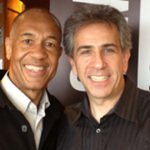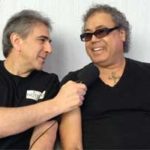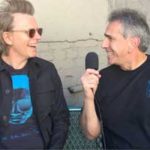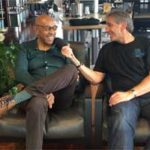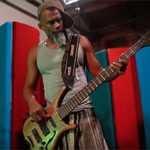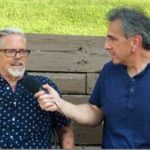Performer, educator and bandleader talks about studying with Ray Brown, working for Henry Mancini and performing with the Amsterdam Philharmonic
Exclusive interview with FBPO’s Jon Liebman
October 18, 2010
John Clayton began learning the double bass at age 16, studying with bass legend Ray Brown. By age 19, John had become a bassist on Henry Mancini’s television series, The Mancini Generation. In 1975, he graduated from Indiana University’s Jacob School of Music with a degree in bass performance.
John toured with the Monty Alexander Trio and the Count Basie Orchestra before taking the position of principal bass in the Amsterdam Philharmonic Orchestra in the Netherlands, where he stayed for five years. He eventually returned to the U.S. to focus on working in the jazz world. John co-founded the Clayton-Hamilton Jazz Orchestra with his saxophonist brother Jeff Clayton and drummer Jeff Hamilton. From 1999 to 2001, John served as Artistic Director of the Jazz for the Los Angeles Philharmonic program at the Hollywood Bowl and has also led many jazz education programs.
Clayton has composed and/or arranged for such notable artists as the Count Basie Orchestra, Diana Krall, Whitney Houston, Carmen McRae, Nancy Wilson, Joe Williams, McCoy Tyner, Quincy Jones, Dee Dee Bridgewater, Natalie Cole and The Tonight Show band. He is currently the artistic director for the Lionel Hampton Jazz Festival, Vail Jazz Workshop and the Centrum Jazz Workshop & Festival.
FBPO: Tell me about your musical upbringing. How did you end up as a bass player?
JC: Music was always in my home because my mom played piano and organ and led the church choirs. When I was in junior high school, I asked the band director if I could play that “big thing over there.” He wrote down tuba on his pad. As I was walking out the door, I saw these four gorgeous, brown, wooden majestic instruments and said, “Ooh. Can I play that instead?” He crossed off tuba and wrote down my future.
FBPO: Studying bass with Ray Brown must have been quite an experience! What kind of teacher was he? What kind of man was he?
JC: Ray Brown was the perfect teacher, mentor and father figure for me and for many others. I learned so many life lessons from him. I learned about bass, patience, respect, joy, jokes, business, record companies, traveling with the bass, being a member of the “bass family” and so much more. In the extension course he taught at UCLA, he had all of us learn all the major and minor scales in two and three octaves, all chord types, walking bass lines and singing melodies while accompanying ourselves on the bass. He brought in Carol Kaye, classical players and played recordings of bassists like Richard Davis, Scott LaFaro and Israel Crosby. I was only 16 at the time and I had never heard of any of these people! Based on those examples alone, I think you can imagine what kind of a person he was.
FBPO: How did you get the gig on Henry Mancini’s TV show? Weren’t you still a teenager at the time?
JC: Ray Brown! He is the one that opened many doors for me. When I was 19 years old, I got a call from Mr. Mancini’s contractor, saying that he wanted me to play his TV show. The dates conflicted with my plans to start at Indiana University. I called Ray, of course. “Meet me at RCA studios at 10 a.m. on Monday. I’ve got a recording session with Hank. We’ll talk to him.” Nervous, scared and green, I went to the studio. Ray introduced me to Henry Mancini on a ten-minute break. “I’ve heard a lot about you. Will you be able to play my show?” Ray explained that I could only do a portion of the show and then needed to start school. Would it be okay to do the show until I had to leave? “Sure! Bloomington? Good school. I get my touring orchestra out of Bloomington.” And that was that. During those years, I toured with Henry Mancini to pay my way through school.
FBPO: What kind of experience did you have at Indiana University? Were Stuart Sankey and Murray Grodner there at the time? Did you study with either of them?
JC: It’s embarrassing how naïve I was. I had never heard of Murray Grodner, though he was a good friend of Abe Luboff, my classical teacher in LA. I hadn’t heard of jazz icon, David Baker, either! Both were at IU. Murray Grodner was the perfect no-nonsense, supportive pedagogue that I needed. He had tissues on his desk for the students that would break down under his pressure! I still love the guy. And, by the way, I never broke down!
FBPO: I’ve always thought of you as a jazz guy with good, solid arco chops. In looking at your history, though, it almost seems like you’re a classical guy who got bitten by the jazz bug. What’s the story?
JC: To be honest, it all kind of happened at the same time. As a kid, I was in beginning strings, junior orchestra, high school jazz band, orchestra and a soul/R&B group. It was all just music and I loved every situation. I loved to swing as much as I loved playing concerti. I’m still that way. My chicken and egg arrived simultaneously.
FBPO: How did you get the gig with the Amsterdam Philharmonic? What was it like living over there for five years?
When I moved to Holland, I told a drummer friend that I was interested in playing solos with orchestras. He knew people in the orchestra world and he told me there was an opening in the Amsterdam Philharmonic for a “Solo” bassist. Solo bass means “principal.” Of course, I didn’t mean principal – I meant that I wanted to stand in front and play solos! But I took the information, thought about it, took the audition and was invited to join. Incidentally, I eventually did get to play a concerto with our orchestra. It was an awesome time for me. I love Holland, the people there, the way of life, their music scene… It was hard to leave.
FBPO: Why did you? What brought you back to the U.S.?
JC: I wanted to pursue writing for films, playing in studios, that sort of thing. I do write and I love writing, but I am no longer interested in writing for film. I had planned on being in Holland for two years. It was so wonderful that I stayed for five! In that five-year period, my wife and I started a family. We have a daughter and a son.
FBPO: Tell me about the Clayton-Hamilton Jazz Orchestra. How did that group come to be?
JC: Drummer Jeff Hamilton, my best friend, and I would often listen to records together. A lot of the recordings were of our favorite big bands, like Thad Jones & Mel Lewis, Count Basie, Woody Herman, Duke Ellington, etc. I got bitten by the writing bug when I was with Count Basie and we started talking about how cool it would be to start something when I would eventually return to LA. Along with my brother Jeff, that’s what we did. We’ve been together twenty-six years now. It’s like a family. In our band, people either quit or die. It’s a pretty wonderful family vibe.
FBPO: In addition to being a long-established performer and prolific composer/arranger, you’re also known as a music educator. Tell me a little about that part of your career.
JC: I’m lucky that I love to teach. Well, guide, really. I don’t believe I teach anyone anything; I think we teach ourselves. But the role of coach, inspirer, guide … whatever, is important. Ray Brown and the musicians in his world were people who gave and shared their talent and knowledge. Ray especially never allowed me to understand anything but passing on knowledge and giving to others. I give as many clinics and workshops as time will allow and only recently gave up my post at USC. I taught there for 21 years.
FBPO: I had the pleasure of seeing you perform in a bass trio with Christian McBride and Rodney Whitaker at last year’s Detroit International Jazz Festival. Do you find people comparing your bass trio to that of Stanley Clarke, Marcus Miller and Victor Wooten? Or even the one made up of Jeff Berlin, Stuart Hamm and Billy Sheehan?
JC: No. Even if someone does make those comparisons, it wouldn’t affect what I do. It’s all about honestly presenting what you have to express. The worst thing you can do is compare your insides to someone else’s outsides.
FBPO: What lies ahead for you and your career? What can we look forward to seeing from John Clayton in the future?
JC: We just released a new Clayton Brothers Quintet recording, called The New Song and Dance. That was a big deal for me. A lot went into that project! Other things include concerts with the Clayton-Hamilton Jazz Orchestra, launching a recording series called “The John Clayton Parlor Series,” innovative programming for the Lionel Hampton Jazz Festival and the Centrum Jazz Workshop, some recordings I’ve produced and preparing more Bass Tips to post on my website. There’s more, but I don’t want to bore you with even more talk about myself!!!
FBPO: What do you like to do when you’re not immersed in music?
JC: Cooking, fishing, hiking, discovering wine and…oh, wait. Did you say when I’m not immersed in music? Okay. That answer would be … sleep. And I don’t often get to do a whole lot of it.
To purchase the Clayton-Hamilton Jazz Orchestra’s
album, “The L.A. Treasures Project,” click here.
